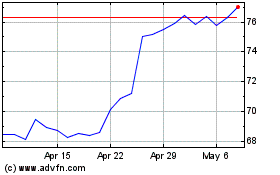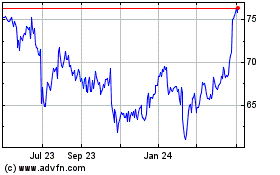Application based on results from the
TROPION-Breast01 Phase III trial
Additional BLA under review in the US for
AstraZeneca and Daiichi Sankyo’s datopotamab deruxtecan for
patients with advanced nonsquamous non-small cell lung
cancer
AstraZeneca and Daiichi Sankyo’s Biologics License Application
(BLA) for datopotamab deruxtecan (Dato-DXd) has been accepted in
the US for the treatment of adult patients with unresectable or
metastatic hormone receptor (HR)-positive, HER2-negative (IHC 0,
IHC 1+ or IHC 2+/ISH-) breast cancer who have received prior
systemic therapy for unresectable or metastatic disease. The
Prescription Drug User Fee Act date, the US Food and Drug
Administration (FDA) action date for its regulatory decision, is
during the first quarter of 2025.
The BLA is based on results from the pivotal TROPION-Breast01
Phase III trial in which datopotamab deruxtecan demonstrated a
statistically significant and clinically meaningful improvement for
the dual primary endpoint of progression-free survival (PFS)
compared to investigator’s choice of chemotherapy in patients with
unresectable or metastatic HR-positive, HER2-negative breast cancer
previously treated with endocrine-based therapy and at least one
systemic therapy. For the dual primary endpoint of overall survival
(OS), interim results numerically favored datopotamab deruxtecan
over chemotherapy but were not mature at the time of data cut-off.
The trial is ongoing and OS will be assessed at future
analyses.
Datopotamab deruxtecan is a specifically engineered
TROP2-directed DXd antibody drug conjugate (ADC) discovered by
Daiichi Sankyo and being jointly developed by AstraZeneca and
Daiichi Sankyo.
Susan Galbraith, Executive Vice President, Oncology R&D,
AstraZeneca, said: “Despite marked progress in the treatment of
HR-positive, HER2-negative breast cancer, most patients with
advanced disease develop endocrine resistance and face the prospect
of one or several lines of chemotherapy. If approved, datopotamab
deruxtecan has the potential to provide these patients an
efficacious and better tolerated alternative to conventional
chemotherapy.”
Ken Takeshita, MD, Global Head, R&D, Daiichi Sankyo, said:
“The FDA’s acceptance of the BLA brings us closer to providing
patients with previously treated HR-positive, HER2-negative breast
cancer an alternative option to conventional chemotherapy earlier
in the metastatic setting. Following our recently accepted
application for advanced nonsquamous non-small cell lung cancer in
the US, along with additional regulatory reviews underway in China,
the EU, Japan and other regions, we are working swiftly to bring
datopotamab deruxtecan as a potential new treatment option to
patients around the world.”
Results from TROPION-Breast01 were presented during a
Presidential Symposium at the 2023 European Society for Medical
Oncology Congress and in an oral presentation at the 2023 San
Antonio Breast Cancer Symposium.
The safety profile of datopotamab deruxtecan was consistent with
that observed in other ongoing trials with no new safety concerns
identified.
An additional BLA for datopotamab deruxtecan based on results
from the pivotal TROPION-Lung01 Phase III trial is under review in
the US for the treatment of adult patients with locally advanced or
metastatic nonsquamous non-small cell lung cancer (NSCLC) who have
received prior systemic therapy. Additional regulatory submissions
for datopotamab deruxtecan in lung and breast cancer are underway
globally.
HR-positive breast cancer
More than 275,000 breast cancer cases were diagnosed in the US
in 2022.1 HR-positive, HER2-negative breast cancer is the most
common subtype, accounting for more than 65% of diagnosed cases.2
Breast cancer is considered HR-positive, HER2-negative when tumors
test positive for estrogen and/or progesterone hormone receptors
and negative for HER2 (measured as HER2 score of IHC 0, IHC 1+ or
IHC 2+/ISH-).2,3 Standard initial treatment for this subtype of
breast cancer is endocrine therapy but most patients with advanced
disease will develop resistance, underscoring the need for
additional options.4,5
TROP2 is a protein broadly expressed in HR-positive,
HER2-negative breast cancer and is associated with increased tumor
progression and poor survival.6,7
TROPION-Breast01
TROPION-Breast01 is a global, randomized, multicenter,
open-label Phase III trial evaluating the efficacy and safety of
datopotamab deruxtecan versus investigator’s choice of single-agent
chemotherapy (eribulin, capecitabine, vinorelbine or gemcitabine)
in patients with unresectable or metastatic HR-positive,
HER2-negative (IHC 0, IHC 1+ or IHC 2+/ISH-) breast cancer who have
progressed on and are not suitable for endocrine therapy per
investigator assessment and have received at least one additional
systemic therapy for unresectable or metastatic disease.
The dual primary endpoints of TROPION-Breast01 are PFS as
assessed by blinded independent central review and OS. Key
secondary endpoints include objective response rate, duration of
response, investigator-assessed PFS, disease control rate, time to
first subsequent therapy and safety. TROPION-Breast01 enrolled more
than 700 patients in Africa, Asia, Europe, North America and South
America. For more information visit ClinicalTrials.gov.
Datopotamab deruxtecan (Dato-DXd)
Datopotamab deruxtecan (Dato-DXd) is an investigational
TROP2-directed ADC. Designed using Daiichi Sankyo’s proprietary DXd
ADC Technology, datopotamab deruxtecan is one of six DXd ADCs in
the oncology pipeline of Daiichi Sankyo, and one of the most
advanced programs in AstraZeneca’s ADC scientific platform.
Datopotamab deruxtecan is comprised of a humanized anti-TROP2 IgG1
monoclonal antibody, developed in collaboration with Sapporo
Medical University, attached to a number of topoisomerase I
inhibitor payloads (an exatecan derivative, DXd) via
tetrapeptide-based cleavable linkers.
A comprehensive global clinical development program is underway
with more than 20 trials evaluating the efficacy and safety of
datopotamab deruxtecan across multiple cancers, including NSCLC,
triple-negative breast cancer (TNBC) and HR-positive, HER2-negative
breast cancer.
Daiichi Sankyo collaboration
AstraZeneca and Daiichi Sankyo entered into a global
collaboration to jointly develop and commercialize fam-trastuzumab
deruxtecan-nxki in March 2019 and datopotamab deruxtecan in July
2020, except in Japan where Daiichi Sankyo maintains exclusive
rights for each ADC. Daiichi Sankyo is responsible for the
manufacturing and supply of fam-trastuzumab deruxtecan-nxki and
datopotamab deruxtecan.
AstraZeneca in breast cancer
Driven by a growing understanding of breast cancer biology,
AstraZeneca is starting to challenge, and redefine, the current
clinical paradigm for how breast cancer is classified and treated
to deliver even more effective treatments to patients in need –
with the bold ambition to one day eliminate breast cancer as a
cause of death.
AstraZeneca has a comprehensive portfolio of approved and
promising compounds in development that leverage different
mechanisms of action to address the biologically diverse breast
cancer tumor environment.
With fam-trastuzumab deruxtecan-nxki, a HER2-directed ADC,
AstraZeneca and Daiichi Sankyo are aiming to improve outcomes in
previously treated HER2-positive and HER2-low metastatic breast
cancer and are exploring its potential in earlier lines of
treatment and in new breast cancer settings.
In HR-positive breast cancer, AstraZeneca continues to improve
outcomes with foundational medicines fulvestrant and goserelin and
aims to reshape the HR-positive space with first-in-class AKT
inhibitor, capivasertib, and next-generation SERD and potential new
medicine camizestrant. AstraZeneca is also collaborating with
Daiichi Sankyo to explore the potential of TROP2-directed ADC,
datopotamab deruxtecan, in this setting.
PARP inhibitor olaparib is a targeted treatment option that has
been studied in early and metastatic breast cancer patients with an
inherited BRCA mutation. AstraZeneca with Merck & Co., Inc.
(known as MSD outside the US and Canada) continue to research
olaparib in these settings and to explore its potential in earlier
disease.
To bring much-needed treatment options to patients with TNBC, an
aggressive form of breast cancer, AstraZeneca is evaluating the
potential of datopotamab deruxtecan alone and in combination with
immunotherapy durvalumab, capivasertib in combination with
chemotherapy, and durvalumab in combination with other oncology
medicines, including olaparib and fam-trastuzumab
deruxtecan-nxki.
AstraZeneca in oncology
AstraZeneca is leading a revolution in oncology with the
ambition to provide cures for cancer in every form, following the
science to understand cancer and all its complexities to discover,
develop and deliver life-changing medicines to patients.
The Company’s focus is on some of the most challenging cancers.
It is through persistent innovation that AstraZeneca has built one
of the most diverse portfolios and pipelines in the industry, with
the potential to catalyze changes in the practice of medicine and
transform the patient experience.
AstraZeneca has the vision to redefine cancer care and, one day,
eliminate cancer as a cause of death.
AstraZeneca
AstraZeneca is a global, science-led biopharmaceutical company
that focuses on the discovery, development, and commercialization
of prescription medicines in Oncology, Rare Diseases, and
BioPharmaceuticals, including Cardiovascular, Renal &
Metabolism, and Respiratory & Immunology. Based in Cambridge,
UK, AstraZeneca operates in over 100 countries and its innovative
medicines are used by millions of patients worldwide. Please visit
www.astrazeneca-us.com and follow the Company on social media
@AstraZeneca.
References
- World Health Organization. Global Cancer Observatory: United
States of America. Available at:
https://gco.iarc.who.int/media/globocan/factsheets/populations/840-united-states-of-america-fact-sheet.pdf.
Accessed April 2024.
- National Cancer Institute. SEER cancer stat facts: female
breast cancer subtypes. Available at:
https://seer.cancer.gov/statfacts/html/breast-subtypes.html.
Accessed April 2024.
- Iqbal N, et al. Human Epidermal Growth Factor Receptor 2 (HER2)
in Cancers: Overexpression and Therapeutic Implications. Mol Biol
Int. 2014;852748.
- Lin M, et al. Comparative Overall Survival of CDK4/6 Inhibitors
Plus Endocrine Therapy vs. Endocrine Therapy Alone for Hormone
receptor-positive, HER2-negative metastatic breast cancer. J
Cancer. 2020; 10.7150/jca.48944.
- Lloyd MR, et al. Mechanisms of Resistance to CDK4/6 Blockade in
Advanced Hormone Receptor-positive, HER2-negative Breast Cancer and
Emerging Therapeutic Opportunities. Clin Cancer Res. 2022; 28(5):
821-30.
- Goldenberg D, et al. The emergence of trophoblast cell-surface
antigen 2 (TROP-2) as a novel cancer target. Oncotarget.
2018;9(48): 28989-29006.
- Vidula N, et al. Sacituzumab govitecan: Antibody-drug conjugate
in triple negative breast cancer and other solid tumors. Breast
Cancer Res Treat. 2022 Aug;194(3): 569-575.
View source
version on businesswire.com: https://www.businesswire.com/news/home/20240402020462/en/
Media Inquiries
Brendan McEvoy +1 302 885 2677
Jillian Gonzales +1 302 885 2677
US Media Mailbox: usmediateam@astrazeneca.com
AstraZeneca (NASDAQ:AZN)
Historical Stock Chart
From Mar 2024 to May 2024

AstraZeneca (NASDAQ:AZN)
Historical Stock Chart
From May 2023 to May 2024
